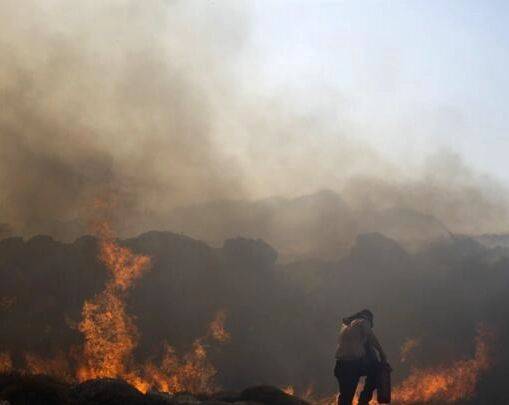Five years ago, Lydia Gerakaki found herself in a life-or-death situation. Sitting in her car with her grandmother and pet dog in tow, she watched terror-stricken as flames engulfed the village where she had spent every summer since she was 3 years old.
The 2018 wildfires in the Greek village of Mati were the second-worst fire disaster of the 21st century. Aided by strong winds, the blaze rapidly ripped through the village, catching many people off guard and leaving them trapped in their homes or cars.
Mismanagement by local fire and police officials added to the devastation, with Greek prosecutors later charging senior officials with negligent manslaughter. “People died because police misdirected them and they ended up driving towards the fire,” says Gerakaki. A total of 104 people lost their lives as a result of the fires.
For over a week now, firefighters in Greece have been struggling to contain brutal wildfires that are ravaging the heat-battered country and its islands.
An air force plane crashed Tuesday while dropping water on the flames in southern Greece, killing both pilots, and a man was found dead on the island of Evia in the first known fatalities of the fires. Many others have been hospitalised with respiratory problems.
Some 30,000 people have been moved to safety on the island of Rhodes, the country’s largest-ever wildfire evacuation. Evacuations have also been ordered on the western island of Corfu, on the island of Evia and in a mountainous area in the southern Peloponnese region of the mainland.
There have already been some unfortunate echoes with the 2018 fire in Mati, as authorities are once again being criticised for their response.
‘Nobody was warned’
It began on a Monday, a lazy summer day like any other in Mati. After spending July 23, 2018, on the beach with her family, Gerakaki made her way back home. In that sweet moment of rest between being out in the sun and preparing dinner, her mother, grandmother and younger sister sat down to watch TV. Images of firefighters struggling to put out a blaze that had been raging since the morning in Kineta, about an hour’s drive west of Mati, flickered in front of their eyes. It was their first warning.
But while authorities concentrated on Kineta, the fire spread rapidly, quickly reaching Rafina – the village next door to Mati. “The sky turned orange and yellow, it became very smoky,” Gerakaki recalls. “And then there was a power cut.”
At that moment, the family knew something was amiss. They packed their two cars with essentials like medicine, water and clothes, making sure their dog and cats were aboard. By the time everything was in order, the fire had reached the house next door.
“Nobody was evacuated or warned,” says Gerakaki. “The only way people knew what was happening was because they saw others had started running.”
In a frenzy, Gerakaki and her mother got into separate cars and made their way out, but almost immediately got separated as they took opposite directions. With her grandmother in the back seat, Gerakaki found herself stuck at a roadblock in the centre of the village with other residents who were also trying to escape. “That’s when I started to panic,” she says.
“I felt like I was in a movie. Everything froze, time slowed down. I lowered my window to look around and see if I could recognise any faces,” Gerakaki recounts. “I was stuck, I needed to get out of the roadblock without leaving my car.”
The young woman eventually noticed her mother’s friend Joanna in a car next to hers, but facing the opposite direction. Shouting through her window, Joanna was trying to help others by telling them where the fire was coming from. “I somehow had the patience to let her finish her sentence,” Gerakaki laughs, “And then I said: ‘Ms. Joanna, what do we do?’” The familiar face took one look at Gerakaki, told her to close her window and instructed her to make a U-turn in front of her car so they could head out together. “She saved me that day.”
Gerakaki had only 3% battery on her phone when her mother called to say where she was. She headed their way and eventually found them. After a flat tire, they left the young woman’s car behind, piling into the second vehicle and driving to their permanent residence in a northern suburb of Athens.
After a sleepless night, the family decided to head back to Mati, where the flames had subsided. The extent of the damage shocked them. “It was like being in a war film,” Gerakaki says. “Everything smelled like burnt flesh and trees. There was smoke everywhere, a few flames here and there … Everything was wiped.”
Luckily for the family, their house was still intact. But for Gerakaki, the devastation went far beyond material possessions. Hearing testimonials of tourists stuck in airports or homeowners losing their properties in the ongoing Rhodes fire can sometimes irk her.
“I see so many people talking about losing their houses and the memories attached to them … I totally understand them, but I never had the luxury to mourn those memories because we had to mourn actual human lives.”
Gerakaki is aware of the power of her experience. Though hesitant to call herself one, she is a survivor who has first-hand information on what to do in case of a fire. “I have a lot of survivor’s guilt,” she says. “But I know that it is my responsibility to tell my story.”
“We need to remember these things, so that they never happen again.”




No comments yet
Be the first to share your thoughts!